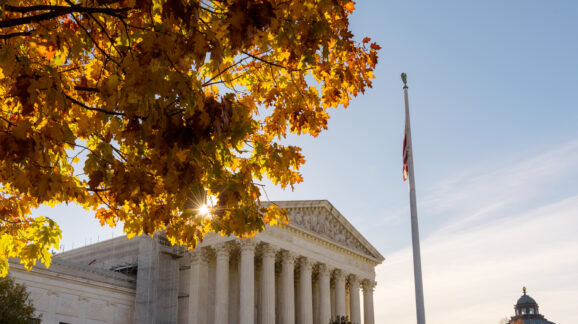Supreme Court likely to decide fate of federal unions

Photo Credit: Getty
A matter likely to end up before the Supreme Court soon is the right of federal government employees to form unions. Whether they retain that right will significantly affect President Trump’s bid to shrink the federal workforce.
A district court judge in northern California has issued a preliminary injunction blocking, for now, a Trump executive order that ended collective bargaining for most federal government workers. The right to collective bargaining was codified by the 1978 Civil Service Reform Act, but the Trump administration has targeted that as part of its broader effort to shrink the federal workforce.
The administration argues that it can break the contracts as a matter of national security. The court determined Tuesday that the unions would suffer “irreparable harm” if those contracts were broken. The bigger fights are yet to come, as the matter still has to go to trial. Whatever the outcome, it will likely be appealed to the Supreme Court.
The unions have been at the forefront, politically and legally, of blocking the administration’s plan to shrink the workforce, which has pink-slipped 59,000 workers to date. Public sector unions involved include the American Federation of Government Employees (AFGE), the American Federation of State County & Municipal Employees (AFSCME), and the Service Employees International Union (SEIU), some of the most powerful in the country. Breaking their collective bargaining contracts would undermine those unions’ finances by robbing them of membership dues. Hobbling the unions would therefore make the administration’s downsizing efforts that much easier.
There’s little doubt that Trump views the unions as opponents in this. The executive order stated that “[c]ertain Federal unions have declared war on President Trump’s agenda” and cited that to bolster the case for ending collective bargaining. The unions allege that that is proof of retaliation that violates their First Amendment rights.
Notably, the court’s Tuesday ruling didn’t refute the underlying national security argument used by the Trump administration: that allowing collective bargaining at federal agencies would impact national security by making it harder to fire non-productive workers and generally reorganize the agencies. “The Court has no intention in this order of second-guessing the President’s national security determinations, or calling on the government to prove the determinations were properly made.”
The court did, however, indicate that it found the executive order overly broad and that it was within the power of the judicial branch to rein in such efforts. “Even with the deference due to the executive and legislative branches in matters of national security and defense, the judiciary may decide the question of constitutional limitations.”
The court further noted that the administration’s national security arguments were tenuous, given that the order covered collective bargaining at agencies without a clear national security mission. “The government itself had a hard time saying why an agency like the National Institute of Allergy and Infectious Diseases might be properly regarded as having a primary mission of national security,” the court said.
Several federal agencies, including the IRS and the Environmental Protection Agency (EPA) were hit with similar injunctions when they tried to break union contracts. They have since walked back those policies. The turmoil increases the likelihood that the Supreme Court will feel compelled to intervene.
How the Supreme Court will view the matter is anybody’s guess, though the Roberts Court has shown deference to the executive branch and a willingness to revisit precedent involving public sector unions. In its 2018 Janus v. AFSCME ruling, the court said public sector employees could not be forced to join a union as a condition of employment. Federal government collective bargaining is relatively recent, having only been codified in 1978. The Roberts Court may decide collective bargaining is a privilege, not a right, for federal workers.